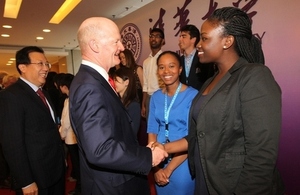UK-China High Level People to People Dialogue aims to bring more UK students to China
Youth and student mobility are high on the agenda for this year’s UK-China High Level People to People Dialogue.

Students from the UK and China discuss key issues affecting youth with David Willetts MP and China's Vice Minister for Education, Hao Ping at the 2014 UK-China Student Forum, ahead of the UK-China High Level People to People Dialogue.
Generation UK, the British Council’s flagship outward student mobility campaign, has announced its ambition to see 80,000 UK students participate in academic study or work experience programmes in China by 2020.
The announcement comes on the eve of the second UK-China High Level People to People Dialogue, co-chaired by the Secretary of State for Health, Jeremy Hunt and China’s Vice Premier, Liu Yandong.
While there are currently over 100,000 mainland Chinese students in the UK, around 5,400 UK students studied in China last year.
The government believes it is fundamentally important that more young people from the UK have opportunities to gain greater exposure to, and understanding of China, putting them in a more competitive position in the job market internationally, but also in the UK, with the growing trend of inward investment from China and with the increasing number of Chinese tourists visiting the UK.
The Generation UK campaign encourages students to consider China as a destination for study or work, promoting the huge range of academic and professional opportunities available in China.
Generation UK is also directly providing opportunities for UK young people to engage with China through academic scholarships and funding support for internships.
The campaign aims to reach the 80,000 target through: promotional campaigns highlighting the benefits of outward mobility; expanding the range of opportunities available, both directly through Generation UK and through other institutional initiatives such as provincial scholarships; generating corporate sponsorship of opportunities through the Generation UK CEO initiative; and through building an alumni network of Generation UK returnees to be advocates of outward mobility to China.
Carma Elliot, Director of the British Council China said:
Generation UK creates incredible opportunities and access for young people in the UK to experience life in China’s rapidly growing economy. By coming to China to work or study, UK students develop a global mind-set and gain international experience and skills that will enable them to thrive in a globally competitive labour market.
George Harding-Rolls, a Generation UK Scholar, who is currently studying Chinese language at Peking University, said:
As participants in Generation UK, we are an investment in the future of UK-China relations, creating more opportunities for mutual interaction and appreciation.
With Generation UK’s ambition to see 80,000 UK students gain experience in China by 2020, eight students journeyed to Beijing today to participate in the 2014 UK-China Student Forum.
Organised by the British Council and Tsinghua University in association with the China-Britain Youth Association (CBYA), the forum offered a group of UK students an opportunity to broaden their own horizons by travelling to China and learn first-hand about its people, society and development, breaking down cultural barriers and increasing mutual understanding in the process.
Eight UK students were selected from several hundreds who submitted essays on the subject, “How can our education better prepare us to compete in an increasingly globalised world?”
The Forum brought together young people from the UK and China to discuss critical issues affecting the futures of young people from both countries. Education provision for the digital generation, employability and opportunity, and the international student experience were all on the agenda.
The event took place as part of the UK-China High Level People to People Dialogue. The Dialogue is a key pillar in the UK-China relationship: it provides a forum to celebrate ties between the two peoples, and a platform from which to drive greater co-operation and ambition. The plenary session of the Dialogue will take place on 23 April at Diaoyutai State Guesthouse in Beijing. The themes for this year’s dialogue are Education, Science and Innovation, Youth, Health, Sport, Media, and Culture.